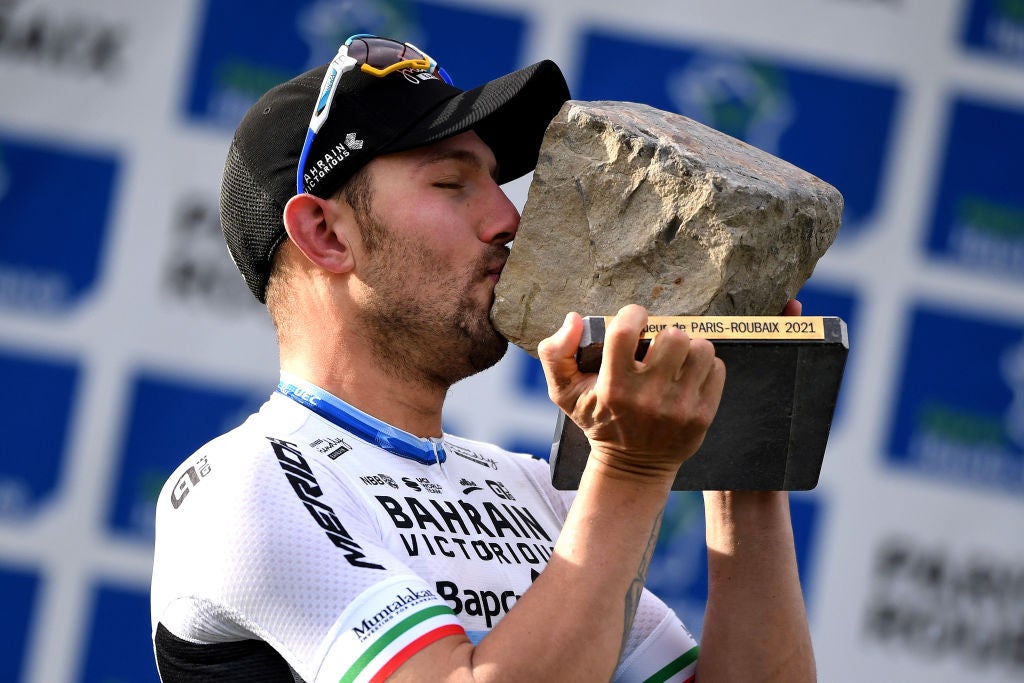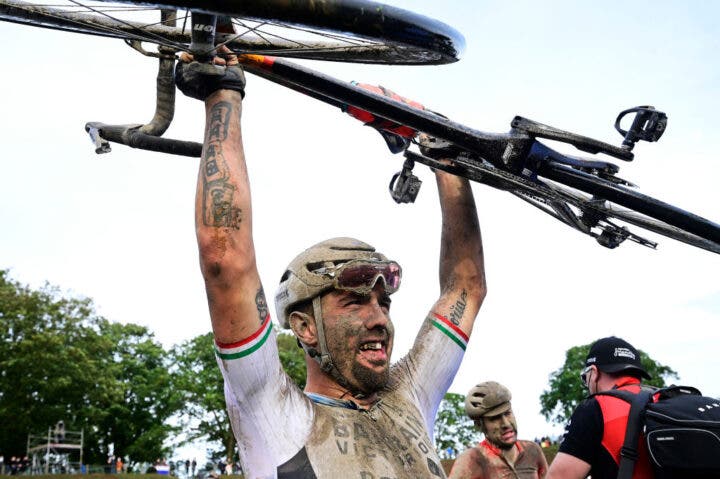Sonny Colbrelli ends pro cycling career: 'I try to do it with a smile for the good it gave me'

Sonny Colbrelli said an emotional farewell to pro cycling Sunday.
The former Paris-Roubaix champion hasn’t raced since his dramatic collapse at the Tour of Catalunya this spring. Tests later revealed the Italian to have suffered a cardiac arrhythmia that in turn led to cardiopulmonary arrest.
Colbrelli was subsequently fitted with a heart-monitoring subcutaneous defibrillator. Although the UCI does not have a formal policy on the matter, Italian law prohibits athletes to compete in elite sport if they have been fitted with a defibrillator.
Colbrelli bows out of the sport just when he was finding his best form. The 32-year-old outfoxed Remco Evenepoel for the European road race title last September and backed it up with unforgettable victory in the mud-drenched autumnal Paris-Roubaix.
“I say goodbye to cycling and try to do it with a smile for the good it gave me, even if it hurts to say goodbye after a season like last year. That was the best of my career.” Colbrelli said Sunday.
“I learned what life offers and what life takes. But it also gives back in a different form. I’m ready to keep trying to be a champion, like on the bike.”
Analysis: After health scare, will Sonny Colbrelli race again?
Colbrelli and his Bahrain-Victorious team posted a lengthy and heartfelt message confirming the rider’s retirement Sunday after Gazzetta dello Sport unearthed the news Saturday.
In the message, Colbrelli reflects on a career littered with near-misses as he led Bardiani-CSF and then the Bahrain team through stage race sprints and the classics.
He talks of how he considered removing the defibrillator so he could return to competition, yet was unwilling to take the associated risk.
Colbrelli will now transition to the Bahrain-Victorious staffing bubble while also pursuing his other cycling projects.

You can read Colbrelli’s full retirement statement here:
“A year ago in this period, I spent my days celebrating the most important victory of my career, Paris-Roubaix. I never thought I would find myself a year later to face one of the most challenging moments that life has put me in front of. But it’s my life that I want to be grateful for, a life I risked losing and which gave me a second chance. That of being here today, to remember that I came out of the “Hell of the North” as a winner, and I did it in a legendary way, which will remain in history and that I will be able to continue to tell my children. It is to them, my family and all the people closest to me that I owe this new life of mine. From them, I am drawing the strength to accept this moment of my sporting career that sees me here today to give up being able to add to my palmarès a victory in a grand tour or Flanders, a lifelong dream.”
After what happened at Catalunya, the hope of being able to continue being a professional rider has never abandoned me, albeit minimal. I knew that the way back would be difficult with a defibrillator. In Italy, it is not allowed by law. With the support of the team’s medical staff, directed by Dr Zaccaria, I did not give up anyway. I resumed cycling under strict medical supervision and underwent several visits and consultations with specialists in the sector. Among these, the director of the University Clinic of Padua, Prof. Corrado, who followed the implantation of the defibrillator. And an evaluation was also made by those who have followed similar cases, such as the footballer Christian Eriksen, who, like me, has a defibrillator and has resumed his professional career. But cycling is not football. It is a different sport; you ride on the streets. You do not play it on a football pitch, where, in case of need, the interventions of the medical équipe can be timely. Their training activities take place in a limited area, while in the case of a cyclist, you often find yourself alone for hours on little-travelled roads.
Precisely this is what makes it more complicated to take another path to be able to compete again. Remove the defibrillator. I admit I considered it. But as mentioned, cycling is different from football. For the reasons mentioned, but above all, also for the intensity of the effort. But first of all, removing the defibrillator is against the medical practice and means removing a lifesaver that is necessary as secondary prevention. A risk too high. A risk that I cannot afford to take. For me, for the opportunity that life, God I believe in, has given me. For Adelina, for Vittoria and for Tomaso. For my parents.
I say goodbye to cycling and try to do it with a smile for the good it gave me, even if it hurts to say goodbye after a season like last year. That was the best of my career. I learned what life offers and what life takes. But it also gives back in a different form. I’m ready to keep trying to be a champion, like on the bike. I will stay in cycling with the Bahrain Victorious, who have been close to me like a second family and will accompany me in this transition period from a rider to a new role that will evolve daily. I will be an ambassador for our partners, work closely with the performance group, and share my experience with my teammates.
I was delighted to see how the children have taken me as a model in recent months. Maybe, I tell myself, because the man covered in mud looks a bit like a superhero. For them, I would like to do something sooner or later. Meanwhile, I will also have the opportunity to be a reference for Team Bahrain Victorious and the development teams: Cycling Team Friuli and the Cannibal U19.
New challenges await me, and with courage, I prepare to face them. I want to do it with a smile on my face. Continue to rejoice in every ride I will do, even if only for fun and no longer for competition.”